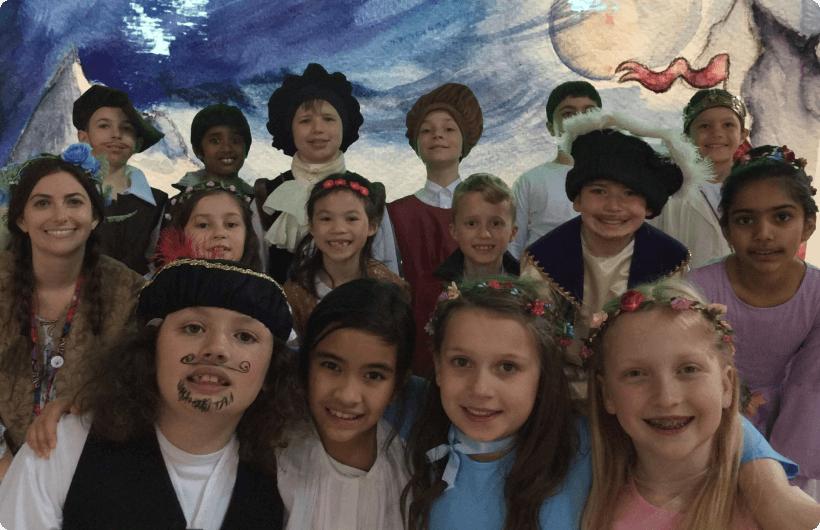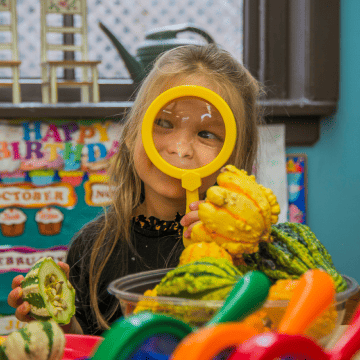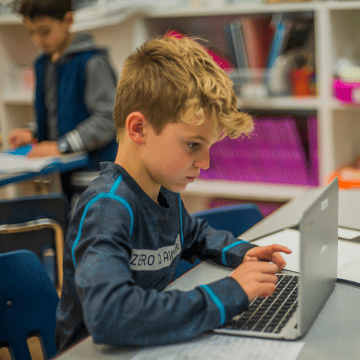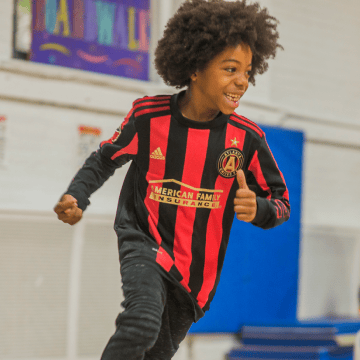Grade 3 Curriculum
Overview
Third Grade students are known for their enthusiasm and an infectious belief in their abilities. This mindset empowers them to create dynamic science projects, enjoy field trips, and build elaborate displays to demonstrate their understanding of various topics. Their curiosity about the larger world leads them to study different countries and share their newfound knowledge with the class. Third graders are also ready to take on exciting challenges, such as organizing a “Bard Bash,” culminating in a movie adaptation of a Shakespearean play.
In the classroom, third graders are encouraged to resolve conflicts with peers and practice kindness. As they explore social dynamics and develop greater self-awareness, character education becomes a key focus. They feel comfortable experimenting with language and acting out social scenarios to express their thoughts. Eight-year-olds are eager to push their limits and discover the world around them, which is why Third Grade is often a time for outdoor lessons or enjoying lunch in the courtyard on sunny days.
Language Arts
Building on a strong foundation in Language Arts from previous years, Third Grade students are challenged to further develop and refine their literacy skills to a high standard. They engage in a variety of reading experiences, including partner reading, whole-group lessons, and guided reading, all designed to help them grow as readers. The curriculum encourages students to read with purpose, gather information, organize their thoughts for classroom discussions, and write essays and reports.
A key focus in Third Grade is the life and works of William Shakespeare, which enriches students’ literary understanding. Additionally, students participate in a spelling program aimed at helping them master essential spelling skills. In language, they deepen their knowledge of punctuation, parts of speech, sentence structure, and grammar. Writing instruction centers on developing an author’s voice and adhering to writing conventions. Finally, Third Grade is the year when students learn to write in cursive.
Mathematics
Third Graders are active mathematicians who gain greater proficiency in basic addition and subtraction while expanding their understanding to include regrouping, multiplication, and division. The year begins with a thorough review of place value and regrouping. Students then explore multiplication through various strategies, games, and activities designed to help them grasp the core concept. Using their knowledge of multiplication, they begin exploring division.
Students also delve into the concept of fractions, becoming more adept at working with fractions in different forms. These advanced skills and strategies enable students to explore a broader range of mathematical concepts, including 2-dimensional and 3-dimensional geometry, measurement, probability, and data collection. Other curriculum units include place value, data analysis, time (clock and calendar), measurements, decimals, and probability.
Science
In Third Grade, the focus of science instruction shifts to the classroom as a laboratory. Students begin exploring increasingly abstract scientific concepts, working like scientists to ask questions that deepen their understanding. They learn how to follow lab procedures, record data, and extrapolate meaningful information from their findings.
Curriculum units include People and Resources, Physical Science (Engineering Process, Electrical and Magnetic Forces, Force and Motion, Space), and Life Sciences (Plants and Animals). Third Graders use design thinking to create and build machines aimed at solving a local environmental problem. Students present their results to parents during Open Science Morning.
Social Studies
Third Grade students begin the year by building a cohesive classroom community. They then review map skills and learn how to identify latitude and longitude in preparation for their study of countries. Continuing the tradition from the previous year, students collect postcards, but this time from a much broader range – from anywhere in the world!
In the third trimester, students write a research report on a country and create a poster to present at the World Showcase. Following this, they study immigration, learning about the reasons people have immigrated to the U.S., both historically and in the present day. They explore the conditions surrounding immigration and what life was like for immigrants upon their arrival. This unit culminates in students writing three journal entries from the perspective of an immigrant arriving in Hoboken.
Co-Curriculars
Third Grade students participate in a variety of co-curricular activities, including music, dance, art, physical education, and world language. For more information, please visit our Beyond Core Academics page.
Milestone Projects

Grade 3 ~ Bard Bash
During this exciting project, Third Graders embark on a year-long learning experience about William Shakespeare culminating in the premiere of “Bard Bash: The Movie” and a Renaissance Faire.
We'd Love to Hear from You:
LOCATIONS
707 Washington Street, Hoboken, NJ, 07030
527 Clinton St, Hoboken, NJ 07030
CONTACT



